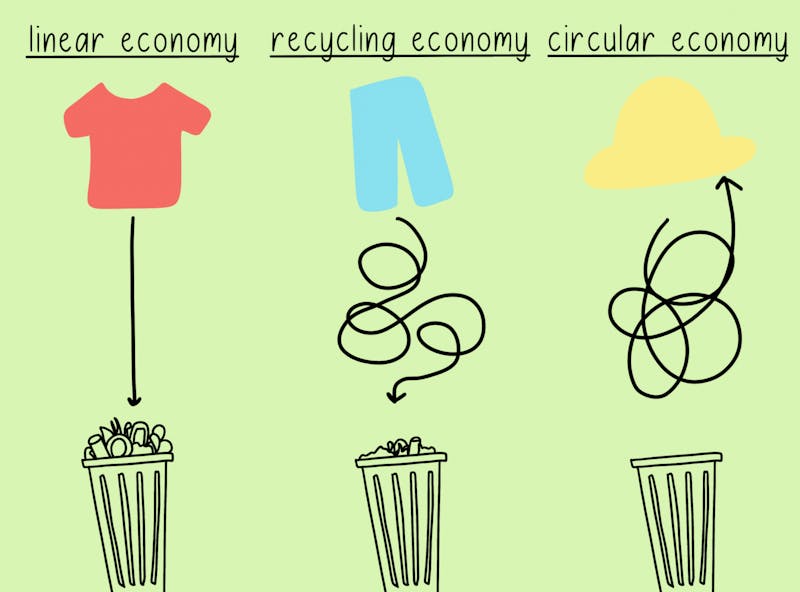
In the face of the ever-growing climate crisis, local Charlottesville thrift stores fight to continue making an impact while facing the threat of large online retailers that thrived during the onset of the pandemic, while students at the University take action through various clothing drives and raising awareness
Though shopping online from the comfort and safety of one’s home tends to be more accessible and cheaper, local thrift shops and community-based options have a lower environmental impact that may outweigh the immediate out-of-pocket price. As the second-largest producer of pollution and 10 percent of the total annual carbon emissions, the clothing industry as a whole has a substantial role to play in the impending climate crisis.
In particular, fast fashion — the rapid production of on trend clothing — is a large contributor to the sheer quantity of clothing that is produced and then disposed of annually, exacerbating climate change.
Megan Young, third-year College student and member of the University’s Office of Sustainability Outreach Team, said fast fashion lends itself to micro trends and themed clothing, which can be damaging for the environment.
“As fashion brands, their entire goal is to make a profit, which means that they are not really interested in the quality of their clothes, but more so the quantity,” Young said. “That's producing enormous amounts of styles without thinking about the long-term impacts.”
Nina Burke was the manager of Uplift Thrift, a Charlottesville thrift store which closed in March. She believes buying from second hand clothing stores like her own is an important way to decrease individual environmental impact.
“We’re sort of operating in the model of a circular economy where people that have too much stuff donate it to us, and then we sell it to people that need stuff,” Burke said. “We keep it out of the landfill, because we hardly throw anything away. Honestly, the waste generated by fast fashion and retail is stunning.”
A circular economy is one in which clothing is recycled and kept in circulation indefinitely in order to minimize waste from clothing and maximize use.
However, Uplift Thrift faced numerous difficulties and struggled to stay afloat during the COVID-19 pandemic. The store closed for four months at the onset of the pandemic while still paying rent.
“It was really hard, but we stuck it out.” Burke said. “That’s only because our community is super supportive.”
The community aspect is essential to Burke’s business, and it is a key reason for the warm and supportive environment that emanates from Uplift Thrift. One of the major themes of Uplift Thrift is the importance of having a safe space for everyone, particularly the LGBTQ+ community. One way that Uplift Thrift creates this safe space is by supplying clothing for everyone and all genders.
Since reopening, another main goal of Uplift Thrift has been to keep procedures in place to mitigate the effects of the pandemic. This has been done through ensuring masks are utilized by all customers, though at times it can be difficult to enforce.
“It’s really important to us to protect the most vulnerable people in our community,” Burke said. “Everyone that walks in here is just as important as everyone else.”
However, as online shopping and fast fashion trends thrived during the pandemic, Uplift Thrift struggled to stay afloat in spite of all efforts. Though the doors of Uplift Thrift closed for a final time March 25, Burke has plans to continue making a difference in the community through pop-ups and community events.
Burke said students at the University should continue shopping secondhand at the variety of locally owned thrift stores throughout the Charlottesville community.
“One of the things that I have liked about our resale community in Charlottesville is that we all work together rather than competing with each other,” Burke said. “We work together to bring customers in and to support each other.”
Another way students have mitigated their carbon footprint through sustainable shopping and clothing use is through clothing swaps and drives as well as making purposeful purchases.
Global Problems, Local Solutions is seeking to make meaningful change at the local level by hosting a University-wide clothing drive in April. Third-year College student Allison McCue, a co-president of the club, is one of the leaders of the upcoming clothing drive, which she believes greatly benefits sustainability efforts in the University community.
“We’re going to do a pop off — essentially like a thrift store, but with the donations that we got so that people here at U.Va. could try just like swapping their old clothes with new clothes that their peers have swapped,” McCue said. “It reduces shopping for a couple pieces at least and then it connects students within the community as well.”
In light of the climate crisis, Young noted the importance of mindful consumption to decrease one’s environmental impact.
“I think progress over perfection is my biggest thing,” Young said. “Just making an impact and making positive choices in the areas that are feasible for your lifestyle and for your stage of life at the moment is what's really important.”
"local" - Google News
May 02, 2022 at 03:09AM
https://ift.tt/FXArQhH
Student groups and local thrift stores unite to initiate change in the face of fast fashion - University of Virginia The Cavalier Daily
"local" - Google News
https://ift.tt/bdGKZgo
https://ift.tt/B7OwvCi
Bagikan Berita Ini














0 Response to "Student groups and local thrift stores unite to initiate change in the face of fast fashion - University of Virginia The Cavalier Daily"
Post a Comment